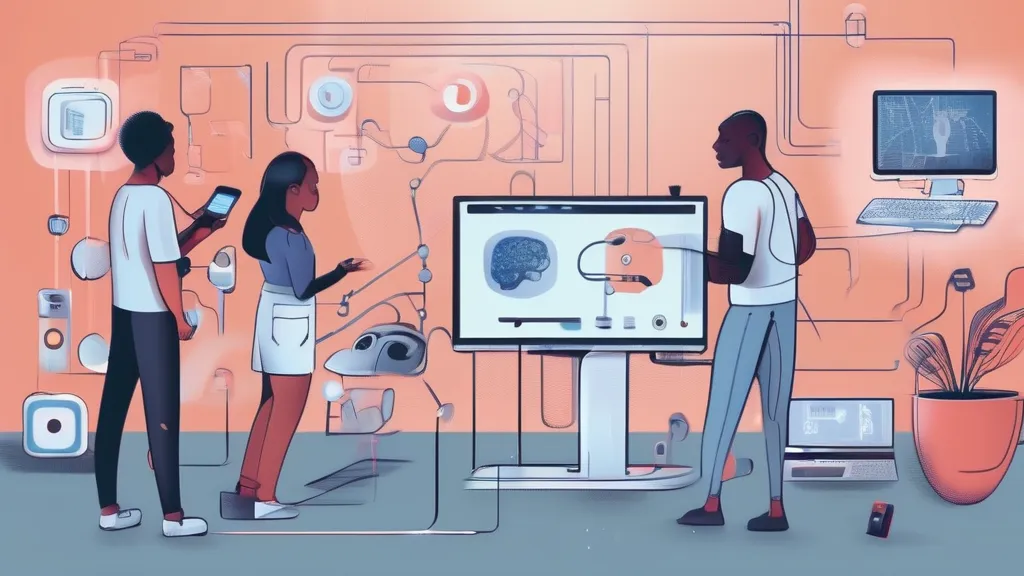The AI Revolution: Navigating the Intersection of Technology and Humanity
Exploring the Transformative Impact and Ethical Implications of Artificial Intelligence

- AI is transforming industries, from healthcare to finance.
- Ethical concerns include bias, privacy, and transparency.
- Balancing innovation with human values is crucial.
- Policy and regulation are key to guiding AI development.
- Diverse perspectives enrich the AI discourse.
The Dawn of a New Era
Artificial intelligence (AI) has rapidly evolved from science fiction to a tangible reality that permeates every aspect of modern life. As we stand on the precipice of an AI-driven revolution, it is crucial to explore the multifaceted implications of this technology. AI holds the potential to reshape industries, redefine societal norms, and transform the very fabric of our daily lives. However, alongside these opportunities come significant challenges and ethical questions that demand careful consideration.
Understanding AI: A Brief Overview
AI refers to the simulation of human intelligence in machines that are programmed to think and learn like humans. These systems are capable of tasks such as visual perception, speech recognition, decision-making, and language translation. The roots of AI date back to the mid-20th century, but recent advancements in machine learning—a subset of AI that enables computers to learn from data—have accelerated its development. According to a 2023 report by McKinsey, the global AI market is expected to reach $190 billion by 2025, highlighting its growing economic significance.
The Transformative Impact of AI
The influence of AI is evident across various sectors. In healthcare, AI-driven tools are enhancing diagnostic accuracy and personalizing treatment plans. For instance, Google’s DeepMind has made significant strides in predicting protein structures, a breakthrough that could revolutionize drug discovery. Meanwhile, in finance, AI algorithms are optimizing trading strategies, managing risk, and detecting fraudulent activities with unprecedented speed and accuracy.
The automotive industry is another beneficiary of AI advancements, with companies like Tesla pushing the boundaries of autonomous driving. These vehicles leverage AI to process vast amounts of sensor data in real-time, enabling them to navigate complex environments with minimal human intervention. As AI continues to evolve, its potential to drive efficiency and innovation across industries is undeniable.
Ethical and Societal Implications
While AI promises numerous benefits, it also raises profound ethical and societal questions. One of the most pressing concerns is the potential for bias in AI systems. Since AI models are trained on vast datasets, they can inadvertently learn and perpetuate existing biases present in the data. A study by MIT in 2022 found that facial recognition systems were less accurate for individuals with darker skin tones, underscoring the need for more diverse training datasets and rigorous bias mitigation strategies.
Privacy is another critical issue. AI technologies often rely on the collection and analysis of large amounts of personal data, raising concerns about surveillance and data security. The European Union’s General Data Protection Regulation (GDPR) has set a precedent for data privacy, but global consensus and regulation remain a work in progress.
Balancing Innovation with Human-Centric Values
As we navigate the AI landscape, it is essential to strike a balance between technological innovation and human-centric values. This involves ensuring that AI systems are transparent, accountable, and aligned with societal norms. The concept of “AI ethics” has gained traction, with organizations like the Partnership on AI advocating for the responsible development and use of AI technologies.
Moreover, there is a growing emphasis on “explainable AI,” which seeks to make AI decision-making processes more transparent and understandable to humans. This is particularly important in sectors like healthcare and criminal justice, where AI decisions can have life-altering consequences.
The Role of Policy and Regulation
Governments and regulatory bodies play a crucial role in shaping the future of AI. In 2021, the European Commission proposed the Artificial Intelligence Act, aiming to create a legal framework for AI that promotes innovation while ensuring safety and fundamental rights. However, as AI technology continues to outpace regulatory efforts, policymakers face the challenge of crafting flexible, forward-looking regulations that can adapt to rapid technological changes.
Diverse Perspectives on AI
The discourse around AI is enriched by diverse perspectives from various stakeholders, including technologists, ethicists, policymakers, and the public. For example, while some view AI as a tool for empowerment and progress, others fear it could exacerbate inequality and unemployment. A 2023 Pew Research survey revealed that 62% of Americans believe AI will have a major impact on their lives, but only 33% feel confident in its benefits.
The Future of AI: Opportunities and Challenges
Looking ahead, the future of AI is both promising and uncertain. As AI systems become more sophisticated, they will undoubtedly unlock new opportunities for innovation and growth. However, the path forward requires careful navigation of ethical dilemmas, societal impacts, and regulatory challenges.
To harness the full potential of AI, it is vital to foster collaboration between governments, industry leaders, researchers, and civil society. By prioritizing transparency, accountability, and inclusivity, we can ensure that AI technologies serve the greater good and contribute to a more equitable and sustainable future.
Conclusion
The AI revolution is a defining moment in human history, offering both unprecedented opportunities and formidable challenges. As we stand at this crossroads, it is imperative to engage in thoughtful, informed discussions about the role of AI in our lives. By embracing a human-centric approach to AI development and governance, we can navigate this complex landscape and shape a future that reflects our shared values and aspirations.
What do you think? How can we ensure that AI technologies are developed and used responsibly? Share your thoughts in the comments below.